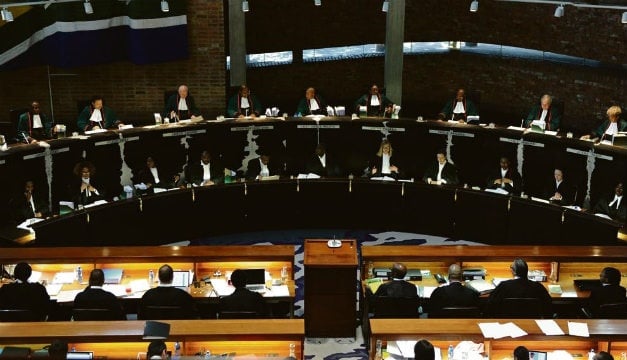
The argument against the amalgamation of the Constitutional and Supreme Court of Appeal may have additional traction in that, within a year, the former has split twice 5:5 on the relevant law, writes Serjeant at the Bar.
Recently the question of amalgamating the Constitutional and Supreme Court of Appeal was raised again, some 20 years after it had been debated and the idea rejected.
One of the primary reasons for raising the question again is that the Constitutional Court now enjoys an expanded jurisdiction, making it the highest court for all legal disputes and not simply constitutional questions which was its original remit.
In turn, this has created an exponentially increased workload; in particular a flood of applications for leave to appeal which the court has determined have all to be decided by the full compliment of 11 judges. Arguably the most powerful argument against the proposal is that, if amalgamated, the new apex court, given its expanded compliment of justices, would not sit en banc but in panels. In turn, this could result in different panels arriving at different decisions on controversial legal questions.
This argument may have additional traction in that, within a year, the Constitutional Court has split twice 5:5 on the relevant law. True, the design was to have 11 judges sit in each case so that an even split does not take place but, twice this has not happened and the relevant law remains uncertain.
The latest split which left the decision against which the appeal was lodged intact involves patent law although the implications of the judgments hold wider implications. The case involved Merck which asserted before a judge sitting as the Commissioner of Patents, that its patent had been infringed.
The contesting party, Ascendis, wished to amend its defence against Merck. Merck argued and the commissioner agreed that the case was res judicata – not subject to further challenge in judicial proceedings. The commissioner found that it was pointless to allow Ascendis to add defences against the damages claim. These defences would inevitably fail, since the Supreme Court of Appeal (SCA) had already ruled Merck's patent to be valid in that there was no merit in an argument about the novelty of that which had been patented.
Ascendis at no stage disputed the novelty issue at the SCA and hence the patent was found to be valid. So all that remained, the commissioner ruled, was to assess what damages Merck had suffered. Ascendis contended that it had amended its pleading to raise new defences: lack of utility and no inventive step taken by Merck.
The Patents Act creates two-track proceedings in a dispute regarding a patent. There is a procedure to gain an order of revocation, where a challenger to the patent (Ascendis in this case) initiates proceedings to remove a patent from the statutory register. The second concerns the case where a patent-holder vindicates the rights the act grants to protect the patent. The judgment penned by Justice Sisi Khampepe cautioned against the idea that findings in revocation proceedings have final, binding effect on a later action in which, as with Ascendis defences are raised that follow the alternative route.
Justice Khampepe, supported by four other justices, warned this might render the dual proceedings nugatory. The key passage of her judgment is the following: "Absent a final and decisive decision made by a competent court or tribunal, this cause of action cannot be said to be res judicata. As I have stated, each of the three grounds in question, inutility, lack of novelty and obviousness, require different facts to be proven and thus constitute different causes of action. Thus, while the litigation may be between the same parties, the remaining elements of res judicata namely: (i) the same cause of action and (ii) a final decision on the merits by a competent court have not been satisfied."
Contrast this to the approach adopted by the other five judges, whose views were set out by Justice Edwin Cameron as follows: "Why does Ascendis now want to introduce new defences against Merck's infringement claim? It is because it previously tried and failed to invalidate Merck's patent on the ground of novelty. In those proceedings, Ascendis, as the first judgment rightly finds, abandoned its obviousness (or non-inventiveness) defence when it argued, unsuccessfully, for revocation. The question is this. Should the courts countenance multiple-stage defences in patent disputes – first-bite at revocation, second-bite when sued for infringement? I think not. This is not how enforcement of patents should most fairly and efficiently work."
At first blush this appears to be a judicial skirmish concerning a patent defence. But the implications run much further – the judgments give an entire scope to the important doctrine of res judicata. When in short is a party which has a judgment in its favour entitled to call a halt to legal proceedings between itself and the same adversary when the latter's legal team dream up new legal points designed to win by another route? Doubtless it will be suggested that the two judgments should be restricted to the issue of patent registration and protection.
But it is easy to think of similar cases in other areas of law in which the question of res judicata becomes dispositive of the case. This five all draw is hardly the stuff of legal certainty. One can only imagine the uncertainty if we changed from one en banc court to having an apex court which sat in panels.
Oh, and by the way, Justice Cameron's approach is to be preferred, particularly in a country where many people refuse to accept an adverse legal answer.
- Serjeant at the Bar is a senior legal practitioner with a special interest in constitutional law.
** Want to respond to the columnist? Send your letter or article to voices@news24.com with your name, profile picture, contact details and location. We encourage a diversity of voices and views in our readers' submissions and reserve the right not to publish any and all submissions received.
Disclaimer: News24 encourages freedom of speech and the expression of diverse views. The views of columnists published on News24 are therefore their own and do not necessarily represent the views of News24.




 Publications
Publications
 Partners
Partners






















